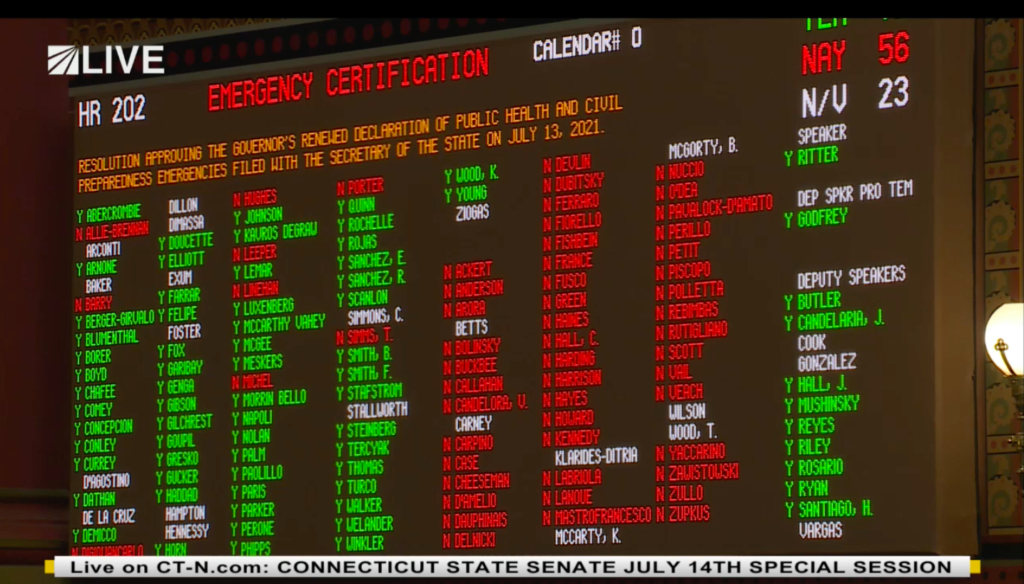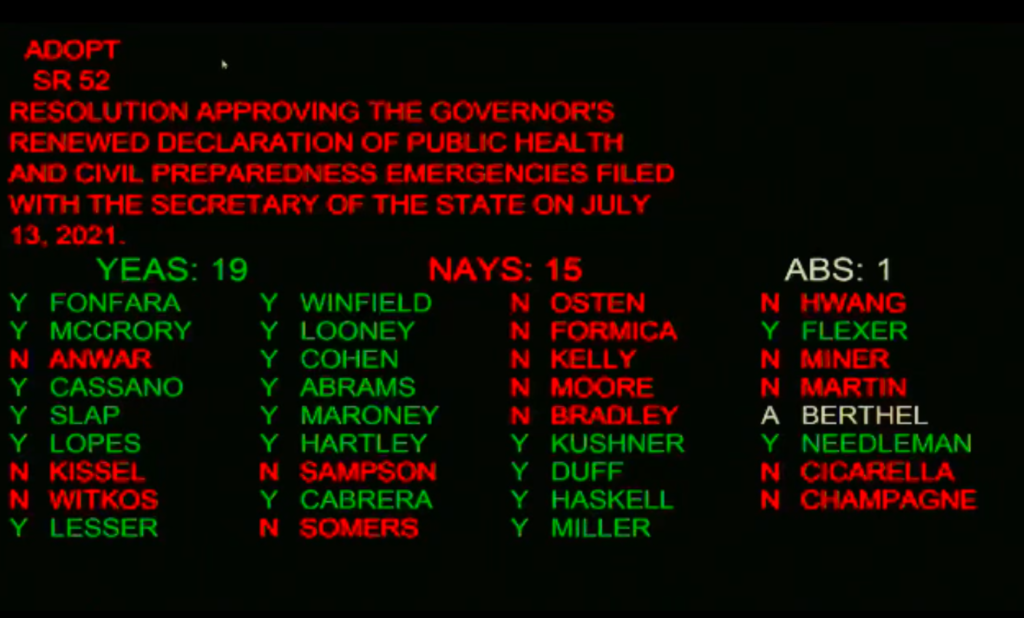The Connecticut Senate and House of Representatives both voted to extend Gov. Ned Lamont’s emergency executive powers through September, although several Democrats broke ranks and voted with Republicans against the extension.
Republicans argued that Connecticut’s low infection rate, high vaccination rate and life largely returning to normal that the health and civic preparedness emergency was over. They also argued against mandating mask-wearing for school children.
“I don’t believe we are in a state of emergency such that the governor should have these extraordinary powers,” said House Republican Leader Vincent Candelora, R-North Branford. “I think that we are setting such a low bar today with a ‘yes’ vote, in allowing a delegation of legislative authority to this governor. I have more faith in democracy than to just abdicate our authority this quickly.”
“Restaurants are full, sporting events are on, concerts are being scheduled. The governor is saying hop on airplanes, go out to dinner, and yet he wants the same authority he got in March of 2020, the same authority today,” Senate Republican leader Kevin Kelly, R-Stratford, said.
Kelly noted that Connecticut would be one of the few states Northeastern states that was continuing broad emergency powers for the governor. “You got to drive seven or more hours to get to a state that has this,” Kelly said.
Democrats supportive of extending Lamont’s powers argued that new variants of the COVID virus warranted continuing the emergency declaration as well as the need for federal funding for the Supplemental Nutrition Assistance Program and housing that are purportedly tied to the state’s emergency status.
“For much of the past seven months the governor has been restrained in exercising his emergency authority issuing very few new orders while ending hundreds of others,” House Majority Leader Jason Rojas, D-East Hartford, said. “I know that people have COVID fatigue, that people want to continue to move back, continue toward normalcy, and we’re doing that.”
“If we reach a point getting close to the end of September where it appears that the Delta variant has receded and not been replaced by something of similar danger, the decision can be revisited then and perhaps we would be willing to do then what we are unwilling to do today,” Senate President Pro-Tem Martin Looney, D-New Haven, said.


Republicans voted as a unified block against continuing the powers following a demonstration at the Capitol on Monday, but several Democrats also expressed doubt and voted against the extension.
Rep. Robyn Porter, D-New Haven, said there were warnings throughout the Capitol that lawmakers who voted against the extension would face consequences from the governor’s office.
“There was a time when I feel this executive order power for the governor was in order and appropriate, however I do not currently feel that way,” Porter said. “I know that some of us who have decided to vote no are being told that there will be ramifications from the governor’s office.”
“I want to put that on the record, because I am voting no today and will not be bullied, I will not be threatened, I will not be intimidated and I take offense – tremendous offense – to the act of even putting that in the atmosphere,” Porter said.
There was also disagreement among Democrats regarding whether those extra federal funds would be cut off if the governor’s emergency powers were not extended – an argument made by Sen. Will Haskell, D-Wilton.
Sen. Cathy Osten, D-Sprague, said she was offended by the political nature of the debate and accusations that a vote either way was somehow a vote against the safety of children and said the General Assembly could have voted on a bill with the eleven or twelve executive orders the governor wanted.
“Other states still get the federal aid without the broad powers of the executive branch, that’s a fact,” Osten said. “Over twenty states have narrowed the executive’s responsibilities on executive powers and are getting the increased SNAP and increased housing.”
“We are essentially saying local boards of ed can’t make decisions, municipalities can’t make decisions and that if we vote ‘no’ then we are essentially putting children at risk. I disagree with that,” Osten said.
Osten eventually voted against extending the governor’s powers.
Sen. Craig Miner, R-Litchfield, also argued that variants of the virus that are appearing worldwide was not cause for extending the emergency declaration.
“I would argue that I think the variants of COVID are going to exist longer than my life, perhaps longer than most of your lives, that’s what they do,” Miner said. “We don’t need an executive order to determine how we’re going to play this out.”
“I don’t know about you, but I’m taking my vaccine for a ride this summer,” Miner said. “I’ve lived too long not to live my life and I don’t want to be bound to the porch of my house. Most of the people I’ve spoken with in my district don’t want to be bound to theirs either.”
The governor’s executive powers will now continue through September and the start of the school year when many parents are concerned about children having to wear masks in the classroom.
The legislature retains its authority to override any executive order the governor issues.
The General Assembly vote comes just two days after a rally of 250 people at the Capitol protested the extension and called for an end to the emergency declarations.


Joseph petrarca
July 16, 2021 @ 10:52 am
Perhaps the cT General aSSEMBLY Republicans should charter a flight to texas to avoid a vote. I suppose they are Neither cowardly nor incompetently immature and selfish in legislating resPonsibly on behalf of the citizenry.